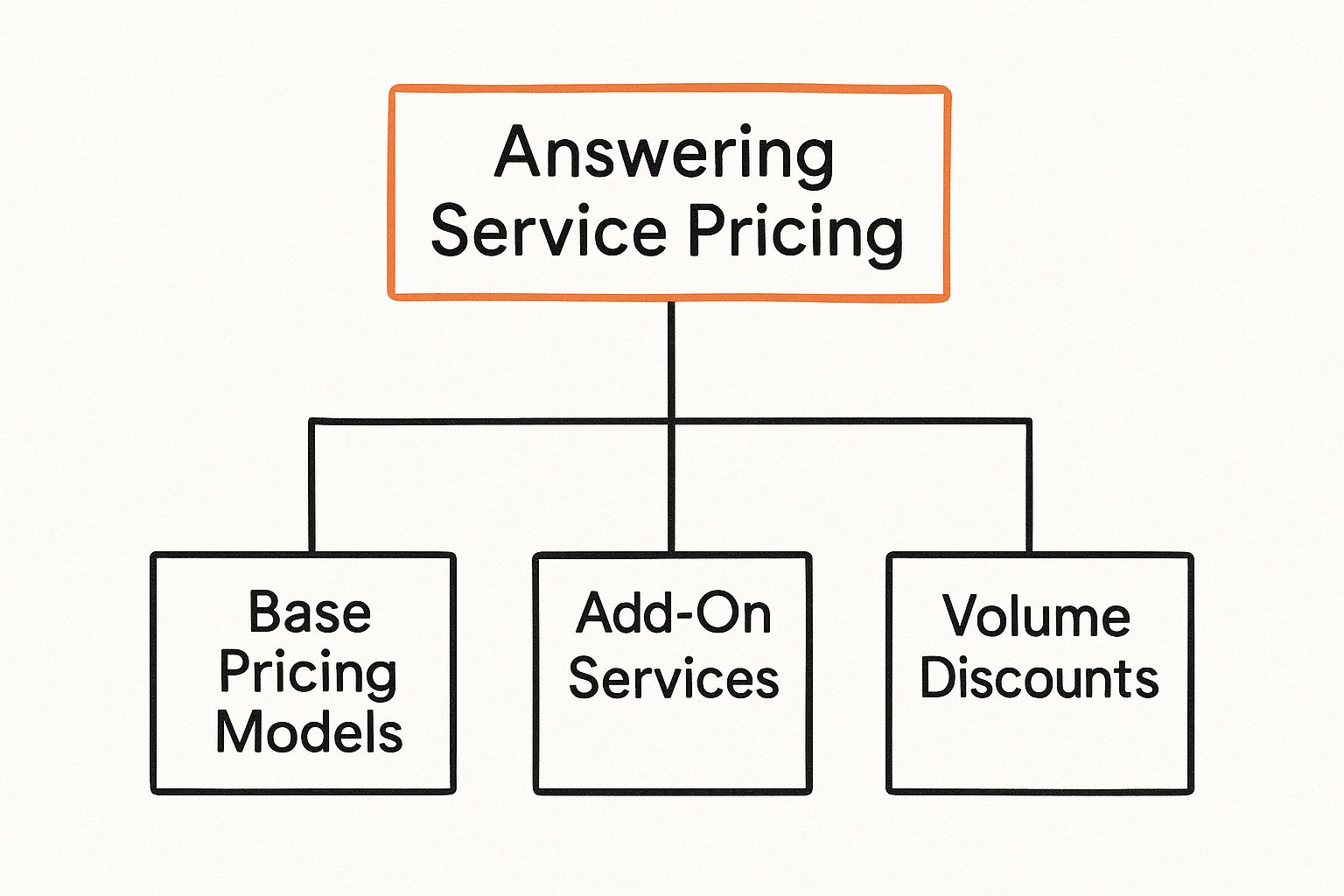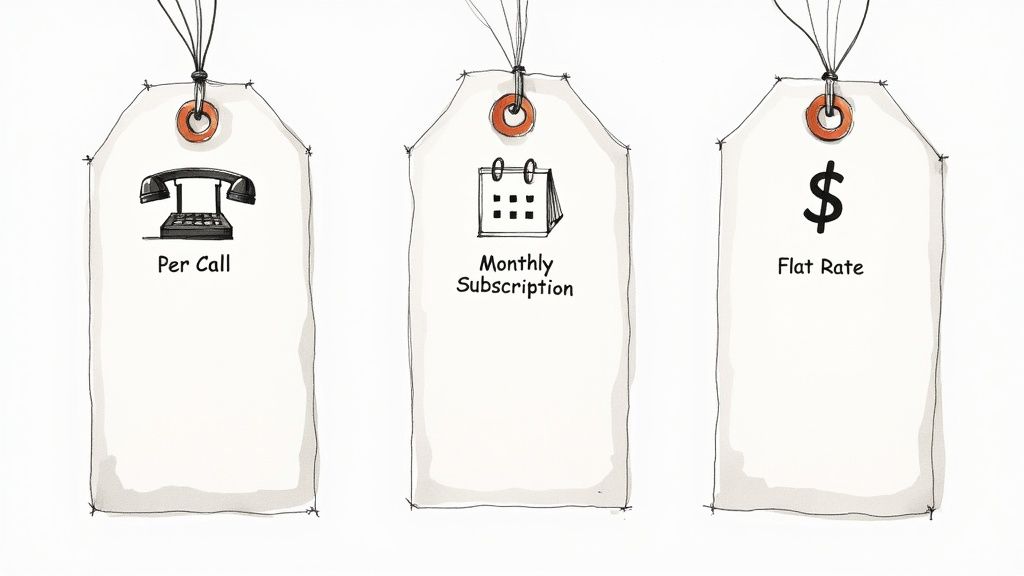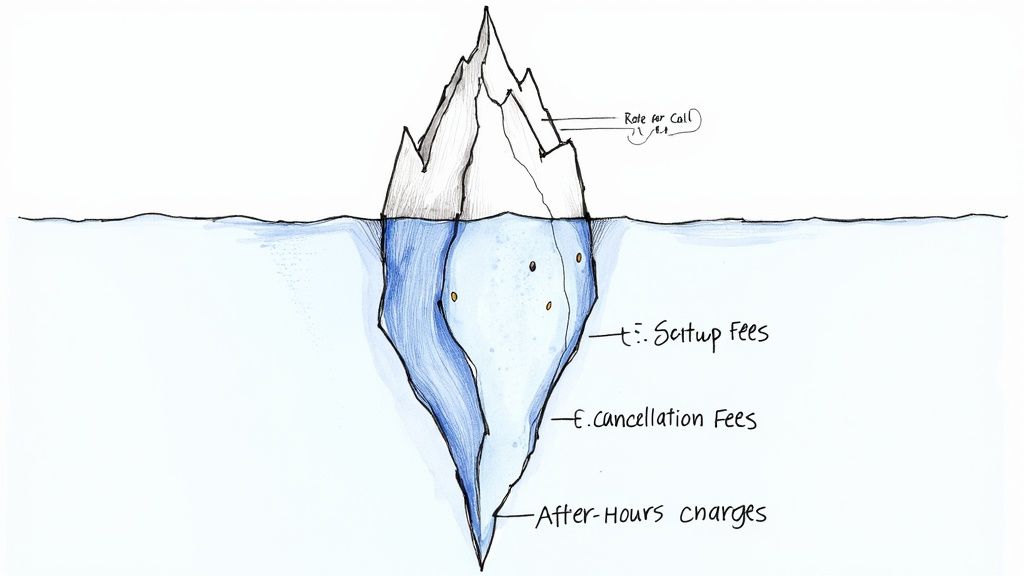Answering service pricing can feel all over the map, with plans ranging from $135 to over $2,900 per month. What gives?
The final number depends entirely on your call volume and the features you need. For simpler setups, you might see costs like $1.39 to $2.69 per call or $1.36 to $1.43 per minute. The trick is figuring out which billing method actually saves you money.
Decoding Answering Service Pricing Models
Think of it like choosing a cell phone plan. Some are pay-as-you-go, others give you a big bucket of minutes, and some are basically unlimited. Nailing down these core models is the first real step to finding a plan that fits your business like a glove—without paying for a bunch of stuff you never use.
This isn't just about finding the cheapest option. It's about understanding the strategy behind each pricing structure. If you're a startup with unpredictable call volume, a flexible per-call plan might be your best friend. But if you're a high-volume operation, you could save a fortune with a flat-rate subscription.
The Three Foundational Pricing Structures
Almost every answering service builds its pricing on one of three foundational models. Each one is designed for a different kind of business and a different call pattern.
- Per-Minute Billing: You pay only for the exact time agents are on the phone for you. This is the classic model and works great for businesses with fairly predictable call lengths.
- Per-Call Billing: This one’s simple. You pay a single flat fee for every call answered, no matter how long it lasts. It’s perfect for businesses whose calls are usually quick and to the point.
- Flat-Rate or Monthly Billing: You pay one fixed fee each month for a set number of minutes or calls. This model gives you budget certainty, which is a huge plus for companies with consistent call volumes.
This visual shows how these core models are just the starting line for your final cost.

As you can see, the base price gets layered with add-ons and potential discounts. Recent data for 2025 shows that call duration, your monthly minute allowance, and extras like SMS messaging are the big cost drivers. For instance, some providers bill around $1.39 per minute, while others might offer a bundle like 200 minutes for $350 a month. It's smart to check out current pricing benchmarks to see how these models stack up in the wild.
The key takeaway is this: Don't just look at the sticker price. The most cost-effective plan is the one that aligns with how your customers actually call you. Mismatching your call patterns with the wrong pricing model is the fastest way to overspend.
Quick Guide to Answering Service Pricing Models
To make it even clearer, here’s a simple breakdown of the three main pricing models. Think of this as your cheat sheet for quickly identifying which structure is the right fit for your business.
| Pricing Model | How It Works | Typical Price Range | Best For |
|---|---|---|---|
| Per-Minute | Billed for the total time an agent is on the line. | $1.36 – $1.43 per minute | Businesses with longer, more involved calls that require detailed information gathering. |
| Per-Call | A flat fee is charged for each individual call handled. | $1.39 – $2.69 per call | Companies that receive quick, transactional calls like appointment setting or basic inquiries. |
| Monthly Flat-Rate | A fixed monthly fee for a pre-set block of minutes or calls. | $135 – $2,900+ per month | Businesses with predictable, consistent call volume that can easily stay within a set allowance. |
At the end of the day, knowing the difference between these models is what empowers you to make a smart decision. To get a feel for what real providers are offering, it helps to look at specific vendor pricing details to compare their packages side-by-side.
If you're ready to really get into the weeds, you can explore our full guide on https://www.marlie.ai/blog/answering-service-cost to arm yourself with all the details you'll need.
What Really Drives Your Final Bill

The pricing plan you pick—whether it's per-minute, per-call, or a flat monthly fee—is really just the foundation of your bill. The final number that shows up on your invoice gets shaped by the real-world operational demands of your business.
Think of your base plan as the ticket price for a flight; the features you add are the baggage fees and seat upgrades that actually get you where you need to go comfortably.
Several factors will nudge your monthly cost upward, but they also bring a ton of value to the table. For instance, if your business needs 24/7 coverage, you’re naturally going to pay more than a company that just needs phones answered from 9-to-5. That round-the-clock availability is what ensures you never miss an emergency call or a hot lead that comes in at 2 a.m.
Specialized Services and Their Impact
The complexity of the tasks you hand off to your answering service is one of the biggest cost drivers out there. Basic message-taking is one thing. But if you need specialized support, that requires more highly trained agents and more robust systems, which logically bumps up the price.
Here are a few common specialized services that will definitely affect your final bill:
- HIPAA Compliance: For any medical practice, handling patient data according to strict HIPAA regulations isn't optional. This means using secure messaging platforms and having specially trained agents, which adds a premium to the service cost.
- Bilingual Support: If you serve a diverse customer base, offering bilingual support can be a total game-changer. Having agents fluent in Spanish or other languages dramatically expands your reach but usually comes with an added fee.
- Complex Call Scripting: A sales team that needs agents to follow a detailed script to qualify leads will pay more than a business that just needs a name and number taken. The more intricate the script, the more agent training and time is required for each and every call.
Your goal shouldn't be to find the absolute rock-bottom cheapest answering service pricing. The real win is finding the best value—a plan that delivers the exact support your business needs to run smoothly and capture every single opportunity, day or night.
Understanding Feature-Based Costs
Beyond those broad specializations, specific features add their own layers of complexity and cost. A simple call transfer, often called call patching, might sound straightforward. But it requires an agent to stay on the line, actively managing two connections at once. This directly increases the billable minutes for that interaction.
Likewise, services that require urgent dispatching for emergency businesses like locksmiths or plumbers involve specific protocols and immediate action, which command a higher price. For a deeper dive into how these features stack up, you can learn more about virtual receptionist pricing and its own unique cost drivers.
Ultimately, every add-on is a trade-off between cost and the operational benefit it brings. Once you understand these cost drivers, you can shift your focus from just comparing base rates to strategically building a service package that delivers a real, measurable return on your investment.
Benchmarking Costs for Your Business

Okay, you get the pricing models and you know what drives costs up. But how do you know if a quote you’re looking at is actually fair?
The trick is to benchmark potential costs against what’s typical for your industry. What a small e-commerce shop pays will look completely different from the monthly bill for a multi-location medical practice, and for good reason.
Every industry has its own unique demands that directly shape answering service pricing. A law firm’s bill, for instance, is often higher because they need agents who can handle confidential client intake and meticulously screen calls. On the other hand, a real estate agency’s costs are driven by the need for lightning-fast lead capture and appointment scheduling to lock down property viewings.
Knowing these nuances is what gives you the confidence to look at a quote and know if it makes sense.
Typical Price Ranges by Business Size
The most straightforward factor in figuring out your monthly investment is your company’s size. Smaller operations naturally have lower call volumes and simpler needs, while larger companies require more hands-on, robust support.
- Small Businesses: These companies usually have lighter call traffic and often just need the basics, like message-taking and call forwarding. Their main goal is simple: make sure no call goes unanswered without blowing the budget.
- Medium-Sized Companies: With more calls coming in and more complex needs like order entry or Tier 1 tech support, these businesses need more agent time and access to more advanced features.
To put some real numbers on this, answering service costs in 2025 vary quite a bit. Small businesses can expect to pay somewhere between $75 and $250 per month for plans that cover 50 to 150 minutes—perfect for basic call handling.
In contrast, medium-sized companies typically spend in the $250 to $600 monthly range for 150 to 500 minutes of service.
A fair quote isn't just about the lowest price. It’s about the right price for the specific services that actually move your business forward. Paying a premium for HIPAA compliance is a necessity for a clinic, not some optional upgrade.
Estimated Monthly Answering Service Costs by Industry
To give you a clearer picture, here’s a look at what different industries can expect to pay each month. The costs are directly tied to the specialized tasks agents are expected to handle.
| Industry | Typical Monthly Cost Range | Primary Service Drivers |
|---|---|---|
| Medical & Healthcare | $300 – $900 | HIPAA compliance, patient intake, after-hours emergency dispatching |
| Legal | $250 – $800 | Confidential client screening, new case intake, appointment setting |
| Real Estate | $200 – $700 | 24/7 lead capture, showing coordination, call routing to agents |
| Home Services (HVAC, Plumbing) | $150 – $600 | Emergency dispatching, job scheduling, on-call roster management |
| E-commerce & Retail | $100 – $500 | Basic order taking, Tier 1 customer support, returns processing |
As you can see, it's the complexity and risk associated with the calls—not just the volume—that really determines the price tag. Paying for expertise and compliance is an investment, not just an expense.
Certain industries absolutely require specialized skills and security protocols, which naturally leads to higher average costs. This isn't about overpaying; it's about paying for the expertise and compliance needed to operate legally and effectively.
For example, medical practices often see rates from $300 to $900 a month because of strict HIPAA compliance rules, complex appointment scheduling, and the critical need for urgent call triaging.
Likewise, legal firms frequently invest $250 to $800 per month to ensure agents can handle sensitive intake screening while maintaining total client confidentiality. For professionals in these fields, finding a low-cost answering service that still meets these rigorous standards is a top priority. https://www.marlie.ai/blog/findin a-low-cost-answering-service
If you want to accurately benchmark your own potential costs, it can be helpful to utilize a cost calculator. This lets you compare quotes against industry standards, giving you the peace of mind that you’re paying the right price for the services that truly matter.
Don’t Get Blindsided by Hidden Fees and Contract Traps
The price you see advertised is almost never the price you’ll actually pay. It’s a classic bait-and-switch, and plenty of businesses get a nasty shock when their first invoice hits, bloated with charges they never saw coming.
Think of it like booking a flight on a budget airline. That $49 base fare looks amazing until you’re dinged for a carry-on, a seat assignment, and even a bottle of water. Answering service contracts can play the same game, turning an attractive monthly rate into a serious budget-buster. Learning to spot these traps is your best defense.
Watch Out for These Common "Gotchas"
Before you even think about signing, you need to put on your detective hat and hunt for fees. Ask direct, pointed questions about any potential charge that isn't baked into the base plan. These little extras can easily double your bill if you're not paying attention.
Here are the usual suspects to look for:
- Setup Fees: Some services will charge you a one-time fee just to get started. This can cover account creation, programming your call script, or training their agents on your business.
- Holiday Surcharges: Expecting calls on Christmas or Thanksgiving? Many providers bill at a premium rate for working on holidays. If you're open 24/7/365, this is a huge detail to confirm.
- Call Patching Fees: When an agent needs to transfer a live call directly to you or someone on your team, that’s called “patching.” It almost always costs extra because it ties up the agent, eating into billable time while they wait for you to pick up.
- Message Delivery Costs: Don't just assume that getting a message via text or email is free. Some companies treat each notification as a separate billable event, just like a phone call.
A trustworthy provider will be completely upfront about their fee structure. If a salesperson gets cagey about extra costs or seems to be rushing you past the details, that’s a massive red flag. A real partner wants you to know exactly what you’re paying for.
The Contract Itself Can Be a Trap
Beyond the nickel-and-dime fees, the contract’s structure is where the real danger lies. You’ll typically see two kinds of agreements, and the one you choose has major financial consequences. A flexible month-to-month plan is great because it gives you an out if the service doesn't work for you.
On the other hand, a long-term contract—say, one or two years—might dangle a slightly lower monthly rate. But there's a huge catch: brutal early cancellation penalties. I know one business owner who got burned by this. He realized the service couldn't handle his company's technical support calls and tried to leave, only to get hit with a bill for 75% of his remaining contract value.
Always, always calculate the total cost of that commitment before you lock yourself into a long-term deal.
How to Choose the Right Plan for Your Needs

Now that you have a clear picture of the pricing models, hidden costs, and contract traps, you’re ready to make a smart choice. Picking the right plan isn't about hunting for the lowest price tag. It’s about finding a service that fits the specific rhythm of your business.
The first step is a quick, honest audit of your own needs. Think of yourself as a detective investigating your own phone lines. The clues you uncover will point you straight to the most cost-effective solution.
Start with a Call Volume Audit
Before you even think about comparing plans, you need to know your baseline numbers. Without this data, you’re just flying blind. Get started by tracking your inbound calls for a typical two-week period to find a solid average.
Your goal here is to answer a few simple questions:
- How many calls do you get each day? This will tell you what "busy" really looks like for your business.
- When are your peak hours? Pinpoint the times of day or days of the week when your phone is ringing off the hook. This is non-negotiable for ensuring you have coverage when it matters.
- What’s your average call duration? Time a few dozen calls. If most of your conversations are quick and to the point (under 2 minutes), a per-call plan might be a perfect fit. If they tend to be longer and more involved, a per-minute plan will likely save you money.
Define Your Must-Have Services
Next, go beyond just the numbers and figure out what you actually need an answering service to do. This is where you draw a hard line between essential functions and nice-to-haves. Are you just trying to stop calls from hitting voicemail, or do you need a genuine extension of your front office?
To help get your thoughts in order, take a look at our guide on what an answering service is and all the things it can handle.
Create a checklist of your core requirements. Does your business need:
- Basic Message Taking: Just gathering a name, number, and reason for the call.
- Appointment Scheduling: Integrating with your calendar to book, change, or confirm appointments on your behalf.
- Lead Qualification: Using a script to ask screening questions and separate the hot leads from the tire-kickers.
- Emergency Dispatching: Following a strict protocol to get in touch with on-call staff for urgent issues, day or night.
Don't pay for features you'll never use. A plumber who needs 24/7 emergency dispatch has completely different needs than a consultant who just wants appointments scheduled during business hours. Be realistic about what your daily operations actually demand.
Ask Vendors the Tough Questions
Once you’ve got your data and your checklist, you can start talking to vendors with real confidence. You're no longer just asking about pricing; you're conducting a final interview to see who can actually meet your specific needs.
Be ready with pointed questions that cut through the sales pitch:
- How do you train agents specifically for my account and my industry?
- What security measures are in place to protect my customers' data?
- How do you handle a sudden, unexpected flood of calls?
- Can I easily scale my plan up or down if my business needs change?
When you follow this simple framework, you stop being a price-shopper and become a strategic partner. You’ll be ready to pick a plan that doesn’t just answer calls, but actively helps your business grow.
How AI and Technology Are Shaking Things Up
The old-school answering service, with its banks of human agents waiting for the phone to ring, is starting to look a little dated. The industry isn't just about live agents anymore. We're seeing a huge shift thanks to technologies like AI receptionists and smart chatbots, and it's completely changing the game—especially when it comes to pricing.
Think about it: these automated tools are fantastic at handling the simple, repetitive stuff. Answering the same old questions, booking basic appointments—they can do it all at a fraction of what it costs to have a live person on the line. This frees up your budget to use those more expensive human minutes for conversations that actually require a human touch. It’s a smarter way to manage your inbound calls, period.
The Rise of Hybrid Models
Now, this doesn't mean live agents are going anywhere. Far from it. What's really taking off are powerful hybrid models that give you the best of both worlds: the raw efficiency of AI and the genuine empathy of a human. An AI can act as the first line of defense, screening calls, and then intelligently hand off the complex or sensitive ones to a live agent.
This blend of old and new is what's lighting a fire under the market. The global telephone answering services market was valued at USD 1.5 billion in 2024, but it’s expected to balloon to USD 2.8 billion by 2033. That growth is coming from this exact integration of classic call handling with smarter digital tools. You can dig into more of the data on this expansion over at verifiedmarketreports.com.
On top of that, today's services often plug directly into the software you already use, like your CRM. This is a massive win for automating data entry and keeping your workflows smooth. Just be aware that these integrations, while incredibly valuable, might also nudge your final monthly bill. Getting a handle on what an AI phone answering service can do is the first step in figuring out which model makes the most sense for your business down the road.
Got Questions? Let's Talk Pricing.
Jumping into the world of answering services can feel a bit like learning a new language, especially when it comes to pricing. Let's clear up some of the most common questions so you can choose a plan with total confidence and avoid any sticker shock down the line.
How Do I Figure Out My Call Volume?
The best way to get a real number is to look at your own data. Pull up your phone system’s call logs from a typical two-week stretch. This is your ground truth.
Count your daily inbound calls and pinpoint when things get hectic. Just as important, time a few dozen of those calls to get a feel for your average conversation length. This simple exercise is the key to deciding whether a per-minute or per-call plan will actually save you money.
Which Is Cheaper: Per-Minute or Per-Call Billing?
Honestly, neither one is always cheaper—it's all about how you use the phone.
- Per-call is usually your best bet if your calls are quick and to the point, like confirming an appointment or taking down a simple message.
- Per-minute tends to offer more value when conversations get longer and more involved, think technical support or detailed client intakes.
Knowing your average call duration is the only way to make the right call here. Picking a plan that doesn't match your call patterns is the fastest way to overspend.
What Kind of Quality Can I Expect at Different Price Points?
You really do get what you pay for. The price tag often tells you a lot about the level of service, agent expertise, and the features packed into the plan.
As a general rule, lower-cost plans (think $150-$250/month) are fantastic for covering the basics like message-taking and call forwarding. Once you start moving into higher-priced tiers (often $300-$900+), you're paying for specialized skills like HIPAA compliance, complex scheduling, or deep CRM integrations. These require more intensely trained agents and more robust, secure technology. The trick is to match your investment to the complexity of the job you need done.
Stop losing jobs when you can't get to the phone. Marlie Ai answers every call instantly, 24/7, and books appointments for just $0.25 per minute. See how much you can save and grow at https://www.marlie.ai.

